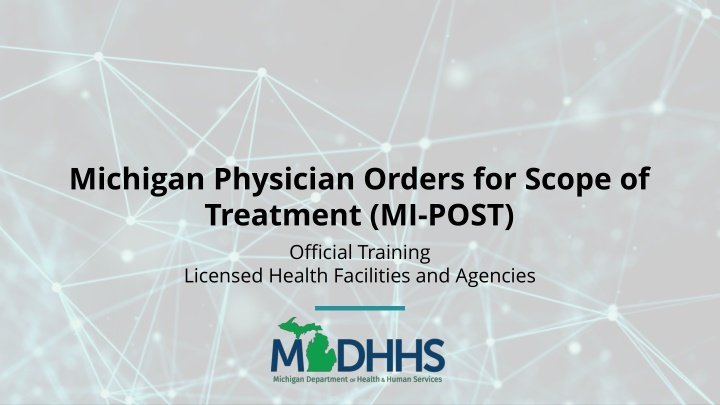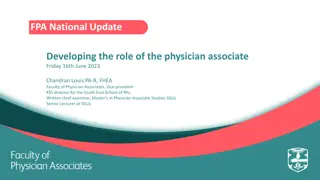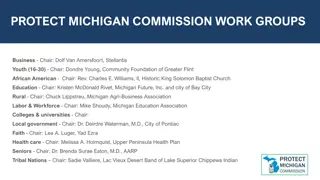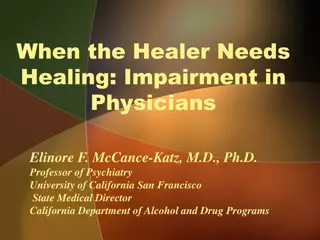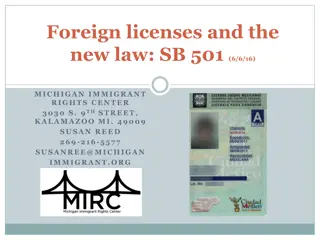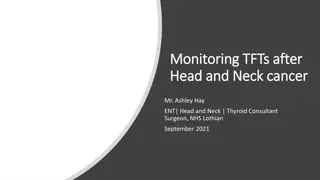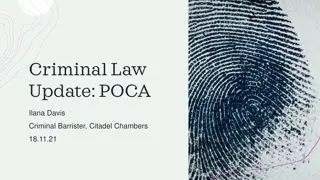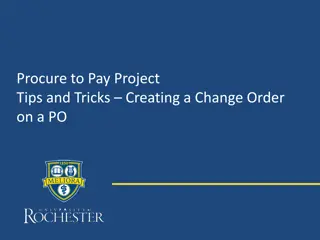Michigan Physician Orders for Scope of Treatment (MI-POST) Training Overview
Explore the training objectives, target audience, and key information on Michigan Physician Orders for Scope of Treatment (MI-POST), including advance care planning, understanding advance directives, and types of Michigan advance directives. Learn about communication of care wishes, troubleshooting conflicts, and more.
Download Presentation

Please find below an Image/Link to download the presentation.
The content on the website is provided AS IS for your information and personal use only. It may not be sold, licensed, or shared on other websites without obtaining consent from the author.If you encounter any issues during the download, it is possible that the publisher has removed the file from their server.
You are allowed to download the files provided on this website for personal or commercial use, subject to the condition that they are used lawfully. All files are the property of their respective owners.
The content on the website is provided AS IS for your information and personal use only. It may not be sold, licensed, or shared on other websites without obtaining consent from the author.
E N D
Presentation Transcript
Michigan Physician Orders for Scope of Treatment (MI-POST) Official Training Licensed Health Facilities and Agencies
Training Objectives Describe the Physician Orders for Life-sustaining Treatment (POLST) Paradigm 1 Describe the Michigan Physician Orders for Scope of Treatment (MI-POST) 2 Identify ways of communicating wishes regarding care 3 Identify appropriate use of MI-POST 4 Troubleshooting conflict 5 06
Target Audience Licensed healthcare agencies Licensed healthcare facilities
Advance Care Planning (ACP) Advance care planning is a process It includes conversations to identify what matters most to an individual over their lifespan Not just one conversation People change their choices many times as their health changes Advance Directives Conversations typically result in the creation of a document to reflect patient wishes and preferences for future healthcare treatments
Understanding Advance Care Planning Source: National POLST website at https://polst.org/advance-care-plans/
Michigan Advance Directive (AD) Michigan Public Health Code Act 368 of 1978 The only legal Advance Directive in Michigan is the declaration of the Patient Advocate An advance directive is a written document in which you specify what type of medical care you want in the future, or who you want to make decisions for you, should you lose the ability to make decisions for yourself three types (of advance directives) are a durable power of attorney for health care, a living will, and a do-not- resuscitate declaration. There is also a declaration of anatomical gift, to take effect when you die Michigan Public Act 368 of 1978
Types of Michigan Advance Directives Documents that convey preferences & choices: Documents that convey medical orders: Out of Hospital Do-not- resuscitate Order (DNR) MI-POST Durable Power of Attorney for Healthcare (DPOAH) Treatment Preferences, such as Living Wills
Physician Orders for Life-sustaining Treatment (POLST) History 1990s POLST movement 2004 The POLST Paradigm was formed Michigan History MI-POST legislation introduced 2017 Public Act 154 of 2017 signed into law on Nov. 8, 2017 by Gov. Snyder
Public Act 154 of 2017 Enacts MI-POST Directs care Establishes parameters and rules for use
Advance Directive/Durable Power of Attorney for Health Care Living Will and Treatment Preferences Out of Hospital DNR MI POST Type of document? Legal document Communication tool Medical order Medical order Adults 18 years or older and of sound mind Adults 18 years or older and of sound mind Adults 18 years or older and of sound mind Parent on behalf of a minor Adult with advanced illness or frailty (12 months or less life expectancy) Intended for? Adults 18 years or older and of sound mind (Assistance Recommended by ACP Facilitator) Designates a patient advocate and any successor patient advocate(s); may include preferences for medical and/or mental health care Adults 18 years or older and of sound mind Adults 18 years or older and of sound mind , patient advocate or court appointed guardian, along with a physician - Cannot be APP (NP or PA) Adults 18 years or older and of sound mind, patient advocate or court appointed guardian, along with Health Care Provider (Physician, NP or PA) Specific medical orders - may include: Full Code or DNR Comfort focused treatment Selective treatment Full treatment Individualized Preferences Who completes the document? Future health care treatment preferences Do Not Resuscitate (DNR) order to be followed outside of the hospital by emergency responders in the home/community. What is communicated in the document? After a properly executed DNR order is completed, an identification bracelet may be applied to individual An individual may choose to wear a DNR bracelet as a means of communicating in public an OOH DNR order is in place. No No No Yes, after 12 months (may be reaffirmed) Does it expire? No Can be written on anything No Yes, paper document must have pink border on 65-pound card stock paper. Document requirements Copies: electronic, paper & photo are acceptable Copies: electronic, paper & photo are acceptable individual county Medical Control Authority (MCA) may have specific requirements Copies: electronic, paper & photo are acceptable 2 adults (cannot be employees of the health or insurance agency, patient advocates, close family members, heir or presumptive heir) None 2 adults; One witness may be a family member. If completed by a legal Guardian or Parent of a Minor, neither witness may be a close family member or presumptive heir) *check with facility/agency policies None Witnessing requirements 10
MI-POST General Rules: 1 2 3 4 5 6 Are for adults with advanced illness/frailty Should use standard form Should be retained in medical record Should be used in acute care settings as a guide Directs care provided by EMS Can be accepted as verbal or telephone orders
Rules for Reaffirming or Revoking Using copies Making changes Reaffirm or revoke
Rules for Conflicts Conflicts with Multiple Orders or Legal Directives Most Recently Dated Legal Document
Questions? Presenter Contact Information
Resources: Michigan Physician Order for Scope of Treatment (MI POST) website PA 154 of 2017 MDHHS-5836 Michigan Physician Order for Scope of Treatment (MI POST) Form MDHHS-5836-AR Michigan Physician Order for Scope of Treatment (MI POST) (Arabic) Form MDHHS-5836-SP Michigan Physician Order for Scope of Treatment (MI POST) (Spanish) Form MDHHS-5837 MI POST Patient and Family Information Sheet MDHHS-5837-AR MI POST Patient and Family Information Sheet (Arabic) MDHHS-5837-SP MI POST Patient and Family Information Sheet (Spanish) Frequently Asked Questions MI-POST Administrative Rules
